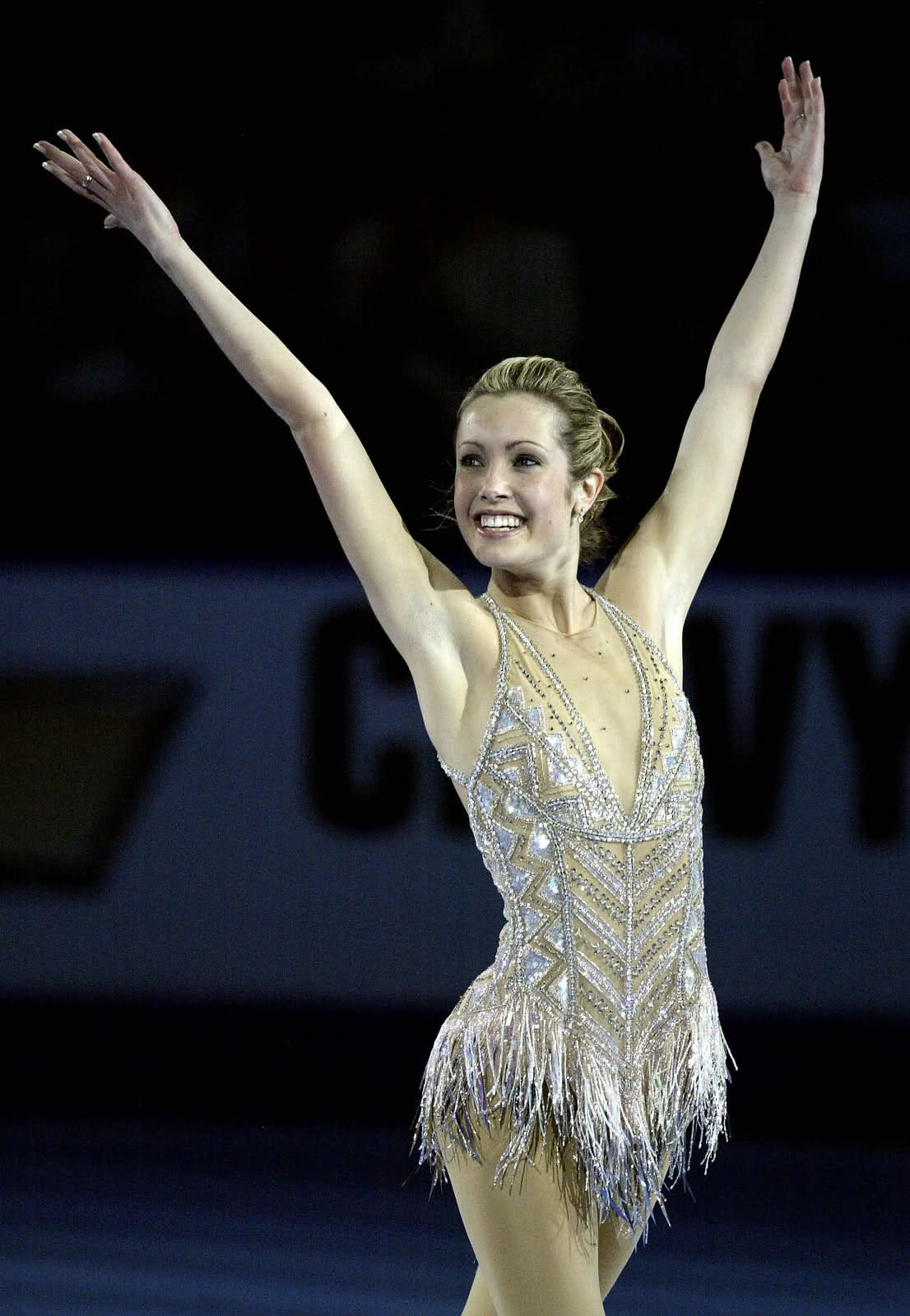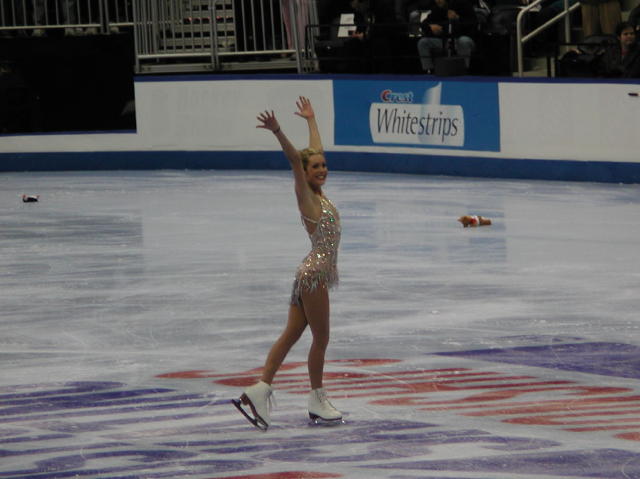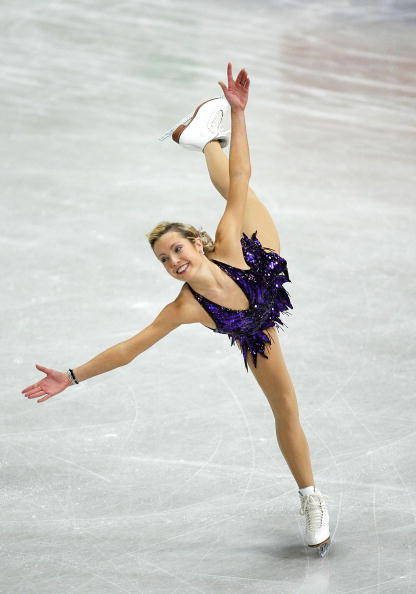
Certainly, Jenny Kirk made a name for herself as an accomplished figure skater.
Undoubtedly, Jenny Kirk represented Massachusetts and New England in remarkable fashion on the ice skating rink. Chiefly, she emerged as one of the top, young figure skaters who dazzled audiences during her career.
Even more, Jenny Kirk embraced a rather unique life while pursuing her figure skating dreams. By all means, at a young age, Kirk understood sacrifices and the importance of hard work.
Nevertheless, while Kirk retired from the competitive sport of figure skating in 2005, she continually inspires others. Most importantly, Kirk, through her work as a coach and therapist, instills positivity and balance with others.
Moreover, Kirk understands the demands and pressures athletes face. As Kirk shares in the first part of her interview, she faced some difficult moments that tested her. In like manner, Kirk makes a difference today as she did on the rink.
Recently, I caught up with Jenny Kirk as we discussed her early years on the rink and initial impressions of this sport. Additionally, she shares some insights about the common facets coinciding with her programs during her career.
Indeed, my conversation with Jenny Kirk proved quite illuminating and empowering. Of course, interviewing Kirk seemed like talking with a longtime friend. Surely, that might explain why Kirk remains one of my role models in all walks of life.
Without further ado, for the first of this two part interview, let’s get “In the Rink with Jenny Kirk” here on The Podium Finish!
Rob Tiongson : Jenny, thanks so much for joining us here on The Podium Finish. I remember watching you in various figure skating events on TV. What catalyzed your passion for figure skating?
Jenny Kirk : So, I really fell in love with skating right after the 1994 National when Nancy Kerrigan was attacked. And I was living in Massachusetts at the time. I remember it was all over the news. Everywhere you went, it was what you heard about.
I just started skating. And the day that she was attacked, I was going to the Boxborough skating club, the Colonial Figure Skating rink. I was getting my first pair of actual, real ice skates.
She was on the news. And the entire energy in the rink, everybody was in that skate shop watching TV. I became addicted to watching the Olympics and to Nancy’s story.
Ultimately, I ended up meeting her and training with her coaches in Cape Cod. They were so instrumental in my career. So, I think it was just really the right time.
Obviously, the attack was not positive. But it was positive in the sense that skating was on TV suddenly every weekend.
So, I fell in love with Scott Hamilton, Michelle Kwan [and] Kristi Yamaguchi, these personalities that we saw so much of [on TV]. And I think it was the personalities that really drew me to skating. I wanted to be like them.
Tiongson : Those are some remarkable figure skaters in their own right and athletes as a whole. Even if you weren’t into figure skating, it’s on the ABC Wide World of Sports.
When you met Nancy Kerrigan, was it a very humbling experience knowing she was as kind as you hoped?
Kirk : Yeah. You know, it’s amazing when I think about the thing about Nancy. As a society, we love to build people up to knock them down a bit.
So, she was the darling of the media right before the games. And then right after, I don’t know if you remember right before the medal ceremony, there was a microphone in the backstage area. [Just] right before you got on the ice.
The microphone picked up her saying something like, “Well, why is Oksana taking so long? She’s just gonna cry her makeup off again.” And then she made the “This is so corny” comment when she went to Disney World and was wearing her medal.
I think the media took that one way. But in getting to know Nancy and meeting her, you realize that she’s in no way snarky. She just a human being who are really highly stressful situation.
So, I think meeting her and hearing more about her story. Watching her change, particularly just being involved in shows with her growing up, she was always really generous, really kind, and just really real. I think that was something that was nice to see.
Somebody that I looked up to was a human being who was a great athlete too.
Tiongson : I’m sure like that’s what makes those experiences so memorable. Obviously, what you see is not always what you get. And there’s more to the story with people as a whole. You dispelled any unfortunate notions about her.
Like you said, I think that’s a thing that’s not only a problem back in the 90s, but even today, unfortunately…

By all means, Jenny Kirk understands the pressures placed upon athletes.
Kirk : Yeah, I think we’ve built these athletes up because of what they’re able to do physically and athletes, celebrities, anybody. And, so, we sometimes have these idealized versions of how they should be.
A lot of the work that I do now is helping athletes to be human and get in touch with the fact they’re allowed to have emotions. They’re allowed to have off days.
It doesn’t take away the fact that they’re wonderful athletes. And they’re allowed to be who they are, particularly in skating.
I don’t know if it’s like this in racing. Because it’s a subjective sport, at such a young age, your image is really important. Whether it’s your physical image or how you present yourself in front of others around the ice.
Sometimes the human being in that could get lost. You’re trying so hard to appeal to the judges or to the fans or to society.
So, that’s something that I admire about Nancy. She’s herself no matter what. I think that’s such an important quality, not only for an athlete, but again, for all of us.
Tiongson : Yeah, absolutely. It actually is kind of the same way in racing. I think it’s just universal across sports like you said. People have this preconceived notion of what someone should be like. And [they] hold them to a higher standard.
If they made the mistake or have a misjudgment or did something questionable, we take them down. It’s unfortunate as we realize we’re not perfect either. So we shouldn’t be judging so harshly.
Kirk : It makes me think of cancel culture. What gets lost in that is actually holding people accountable and taking responsibility. If we just cancel people, or if somebody makes a mistake, because oh, no, they’re canceled, they’re done.
It actually doesn’t teach us as a society or the individual, the importance of saying, “Hey, we’re human. Let me grow and let me learn from this. And let me do better and actually show my evolution as a human being.”
Versus “Oh, I made one mistake.” Or “I did something that isn’t in alignment with this, how I want to be viewed or my character, my values. And now it’s out.”
Tiongson : No, absolutely. You mentioned a little bit about being trained and coached by the Scotvolds, Nancy Kerrigan’s coaches. What was it like to be trained and mentored by them when you were beginning your career?
Kirk : Yeah, it was a very, when I look back on it, it was a formative experience. And I think Evy and Mary balanced each other out really well. So, the summer, I turned 11, 12 years old, I started to live away from home on the Cape [Cod].
My family lived in Newton and Brookline. During the week, I would live on the Cape and train with them. And then I come home. It really taught me to be very independent at a young age.
With Evy and Mary, they’re not going to hold your hand figuratively. So, you get your 20 minute lesson. And the rest of the three hours that you’re on the ice, you kind of have to fend for yourself.
Evy, who recently passed, was the type of coach that you had to earn his respect. You had to earn those compliments. So, it taught me at a young age that I had to work hard.
There was nobody at the end of the day. I didn’t have a parent in the stands during the week who was monitoring what I was doing or pushing me. It was mine.
So, I made the sacrifice to move away from home and to change with them. And they were quite extensive coaches.
It was a big sacrifice to my family. I knew how heavy that sacrifice was both on myself and my family. It really put a lot of responsibility on my shoulders at a young age.
Also, it helped me make my career my own. And [to] see that the results weren’t just going to happen. I had to work for them. That’s really something Evy and Mary instilled in their athletes.
Tiongson : I can’t imagine being that young and basically being so independent. You’re obviously invested in what you wanted to do at that time. But, you took a lot of criticism and harsh judgment at a young age.
So, it had to be the years that you formed [and learned] how to cope with those moments. When you look back at it now, is it something where you’re like, “Wow, how the heck did I do all that?”
Kirk : Yeah, I think, you know, as kids, our brains, we don’t think a lot about the big picture. So, it’s just, OK, this is what I love to do. And that is a tough experience.
It’s a little bit weird that I’m not living in my family or living with this kind of stranger. I have this pressure of going out and competing in front of thousands of people and all of that.
But, you learn how adaptable you are and how resilient you are. And, I think as an adult, now, looking back on it, we all have these experiences as adults, where you look back on something and think, “How did I do that?” (laughs)
Those are the qualities. Because a lot of the do’s and don’ts are so hard on ourselves. Those qualities will go anywhere.
What enabled you to cope and really succeed as a kid in some of these tough situations, those qualities are still with you. So, yeah, I look back with pride.
Tiongson : It’s almost like being a different person. I think you bring up a good point about what it’s like to be a kid or a teenager. You’re not always thinking so far ahead, you’re thinking in the moment.
Now, I think, in our 30s, we’re like, “Well, you know, gotta think not just today, five days ahead or 10 days…”
Kirk : (laughs) Now, we’re thinking about the future! And you know, how is this gonna, what is this financial?
Tiongson : It’s crazy to think. And I’m sure you probably have thought this too. I’m sure you’re happy now.
Do you sometimes find yourself going, you know, “Sometimes, I wish I could wake up and go back to a certain year. It could be for one day. I can go back and go through it. And realize, maybe that big problem I had wasn’t so big after all?”
Kirk : Yeah. Going back to you and say, “Oh, what I know. Now, if I had known that, then, how could things be different?” Or, you know, just, “If I knew, yeah, exactly that those things that.”
You make a great point, Rob. Using that now, when you’re facing a problem to realize, “OK, well, that problem when I was 12 years old felt really huge.”
So, maybe I’m gonna look back on this problem at 35, 36. And think, “OK, at 40, that wasn’t that big of a deal.”
Tiongson : I’m hoping that’s the case for sure. And I’m thinking you’re going to be correct on that. No, I’m not going to be like, “Well, it’s four years later. Let’s see how that’ll work out! (laughs)
Kirk : Right, the problems you get, sometimes, they have a little bit more weight with adults. But most of the time, it’s those same patterns of thinking that we catastrophize with this.
Tiongson : Yeah, well, if I could invent a time machine, I would tell my 15 year old self, “Just be happy and be yourself.”
Kirk : Yes, just be yourself. And know everything is temporary. Good and bad.
Tiongson : Exactly. Now, one of my earliest memories of you was when you won the gold in the 2000 World Junior Championships. I remember thinking, “That’s gonna be who I want to follow and get so invested in with figure skating” even though I can’t do what you did. I could not even try. (laughs)
How euphoric was that moment in Germany, when you were the sole skater in the US to have won gold in that competition?
Kirk : Yeah, when I look back on it now, it seems like part of it feels like it was just yesterday. Another part of it feels, like you said, it was a different lifetime. But I think what, you know, in that moment, I was so focused on being happy. And it’s gonna sound so cliché. But just being happy to be there.
And I wanted so badly to be the top ranked American. So I let that competitive nature I have come out. It was really the pinnacle of my career. One of the best moments of my skating career when I look back on it now.
Tiongson : Now, I remember, I was just like, “I hope she gets the gold. Please judges, see it that way.” And they did.
Let me put it this way. I was excited. When my favorite driver, Jeff Gordon, won races back then, I’d be pumped. But when you won, I think I celebrated as hard as I did when Jeff would win a race. So, that’s how highly I regarded you.
Kirk : Aw, thank you.
Tiongson : You’re very welcome. I noticed throughout your career, you had a lot of different songs that you would play for your various skating programs. But what would have been your favorite to look back on today? And which one would you say, “Yeah, that’s the one that I identify with today?”
Kirk : I think my Chicago short program in 2004 and 2005. And then I also used that music as a show program on tour both those years.
When I watched the movie Chicago, I just, I fell in love with the music and the dancing and all of the glitz and the glamour.
So, that’s definitely one that when I look back on it. Every time that music would play, whether it was practice or in competition, I felt good. I felt like myself.
Sometimes, you may not connect with the music. And even if you skate well to it, it just doesn’t feel like you. And, I always connected really well to that music.
Tiongson : Let me ask you, if you heard a song from Chicago today, does it make you go and think, “Yeah, I can pull off some dances moves now?”
Kirk : It does! It makes me go right back to that time of my life. Yeah.
Tiongson : Awesome. And this is probably a silly question to ask. But, I would imagine you would’ve had some input as to what song would play for your programs. Is that correct?
Kirk : Sometimes, yes. That was definitely a program that I said, “I want to skate to this. And this is my music.” But, then with other programs, I didn’t have the input that the coach would say, “This is what you’re going to skate to.”
They would really advocate for the program because they thought that it was appealing to the judges. Or, it would fit the stage in your career that you were at that time. But that was a program where I said “Nope, I have to skate to this.” (laughs)
Tiongson : At least you didn’t have to be like in that skit on SNL when Nancy Kerrigan was figure skating with Chris Farley. (laughs) I always laugh about it because it reminded me what you said earlier about Nancy as a really fun and great person. And she had a good time parodying figure skating when they danced to Kenny G. They did “Pump Up The Jam.” I was like, “That’s awesome.”
Kirk : (laughs) Yeah, sometimes, particularly when you’re skating on tour, you’re given music for group numbers. And you’re like, “OK, I probably would never listen to this or skate to this.” But you make it work.
Tiongson : You probably smiled and grinned. But then afterwards, you thought, “No, please don’t play that song again.”
Kirk : Right? You hear it on the radio and immediately change the channel.
Tiongson : I would say my favorite was the Beatles concerto that you did early on. That would have been my favorite for sure. I’m sure that teenage you, if you had a choice, would have had a different option.
Kirk : Yes, it’s funny how everything changes as you age at different stages.
Tiongson : Now, it’s very inspirational about how you overcame so much. You went through some challenging, difficult times. And I can’t imagine having to reconcile past it.
You lost your mother at a young age and had other things that happened as you’ve shared in past interviews. But, how did you get past each of those? And what advice would you give your younger self with what you went through?

Primarily, Jenny Kirk inspires others through her experiences. (Photo: Stuart Franklin/Getty Images)
Kirk : Yeah, so I think part of the work that I do now, with skaters, is helping. It’s kind of giving them the insight, hopefully, to trust themselves. And that’s what [I do] and to listen to themselves, and to give them the tools that I wish that I had when I was younger, and I was competing.
After losing my mom, I struggled with an eating disorder towards the end of my career, which is why I ultimately retired. It felt like at the time, I was all alone, and that I didn’t have the support that I needed.
So, I think if I could go back and give myself some advice, it would be, “This is just a part of your life. Skating isn’t everything.” Particularly as a young athlete, when it’s something, you know, I wasn’t going to college.
The stakes are so high leading into the Olympics. You think that without skating, you’re nothing. Or that you’re never going to find another love, that this is the only thing that you have.
And so, learning that no, “This is part of me. And it will always be part of me. It’s something that I love. But taking care of myself and listening to myself and giving myself what I need as a person is ultimately what’s most important.”
I think that’s what I would have wished somebody could have told me back then. And I hope to instill in some of the clients that I work with who are skaters that you can listen to yourself.
Only you know what’s best. And taking care of yourself is the most important thing.
Editor’s Notes
Special thanks to Jenny Kirk for taking the time recently for this interview on The Podium Finish! You can keep track of Jenny with her Instagram and her official website! Stay tuned for Part II of my interview with Jenny soon!
Rob Tiongson is a 30-something motorsports journalist who enjoys sports like baseball, basketball, football, soccer, track and field and hockey. A Boston native turned Austinite, racing was the first sport that caught his eyes. From interviews to retrospective articles, if it's about anything with an engine and four wheels, it'll be here on TPF, by him or by one of his talented columnists who have a passion for racing. Currently seeking a sports writing, public relations, or sports marketing career, particularly in motorsports. He enjoys editing and writing articles and features, as well as photography. Moreover, he enjoys time with his family and friends, traveling, cooking, working out and being a fun uncle or "funcle" to his nephew, niece and cat. Tiongson, a graduate of Southern New Hampshire University with a Bachelor of Arts in Communication, pursues his Master of Arts in Digital Journalism at St. Bonaventure University. Indeed, while Tiongson is proud to be from Massachusetts, he's an everywhere kind of man residing in Texas.












